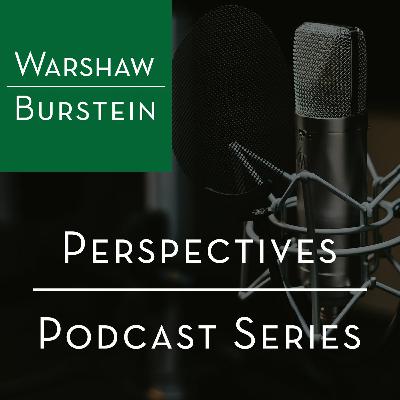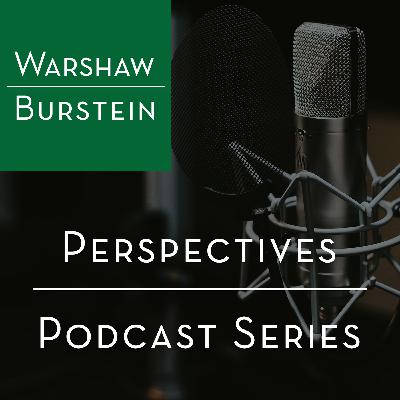Discover WB Perspectives | Podcast Series
WB Perspectives | Podcast Series

25 Episodes
Reverse
Felicia Ennis, Partner in the Employment law group, discusses the elements of a post-pandemic Back to Work Plan for businesses in this podcast.
Kimberly C. Lau, Warshaw Burstein, LLP Partner, and Chair of the Title IX/College Discipline Practice addresses the important steps students need to take when they arrive on campus and when they engage in sexual activities. Listen to this podcast if you are a parent sending your child off to college or a student about to go to college or perhaps, already in college. As a result of listening to this podcast, you will gain a clear understanding of how to navigate sexual misconduct on college campuses.
Warshaw Burstein real estate finance partner Mike Zukerman discusses Property Assessed Clean Energy (PACE) Programs. These programs are an innovative and increasingly popular mechanism for financing energy efficiency and renewable energy improvements in both commercial and residential real estate developments. PACE programs allow a property owner to finance these up front improvements and pay the cost back over time through a voluntary assessment. The number of states and municipalities that have enacted these programs is growing.
Warshaw Burstein partner Marshall Lester discusses his work as a teacher of international corporate law at programs in countries in the former Soviet Union. In this podcast he gives perspectives on the differences between American and overseas students, discusses their interest in U.S. law and offers insights into the fascinating regions in which he has taught. Over the past five years he has taught courses at law schools in Riga, Latvia; Vilnius, Lithuania; Kaliningrad, Russia; Yerevan, Armenia and this past year in Moscow. He is scheduled to teach in Tartu, Estonia this fall. Mr. Lester has taught at these schools in association with the Center for International Legal Studies, www.cils.org, located in Salzburg, Austria.
Warshaw Burstein partner Meryl Wiener examines the newly announced SEC Examination Priorities for 2019. She outlines what SEC registered entities, from established broker-dealers to newly-formed investment advisers to hedge funds, should consider in dealing with a routine examination by the SEC. Meryl notes that due to manpower and cost constraints, the SEC Office of Compliance Inspection and Examinations (OCIE) only is able to examine a small fraction of entities that are subject to SEC rules and regulations. Every year OCIE announces a list of priorities that it will consider in choosing which entities to examine and that will determine the scope of the examinations. This year’s list includes a new priority, digital assets, which includes cryptocurrencies, coins and tokens, as the number of digital asset market participants has grown rapidly.
Warshaw Burstein partner Barry Klingman and of counsel Mike Zukerman discuss foreign investing in New York real estate. Mike outlines the ways foreign investors are getting into the market and which countries are leading the way. Barry discusses the unique structure of investments by foreign buyers, the special U.S. estate tax considerations that foreign investors face, and a special structure that Warshaw Burstein employs for some clients to reduce estate tax liability. They address the issue of whether foreign investors pay more than U.S. investors for the same assets, and a recent development - the qualified opportunity zone program -- that allows deferral and reduction of capital gains liability. Finally, they weigh in on how long the New York real estate boom can last.
Warshaw Burstein Of Counsel Michael Zukerman explains the many opportunities available to developers to use tax exempt bond programs to finance multifamily residential real estate developments. Zukerman outlines the rules of the federal and state programs available to for-profit developers and non-profit organizations.
Warshaw Burstein Of Counsel Michael Zukerman explains the benefits of and differences between Mezzanine and Preferred Equity Financing for Real Estate Deals. In a detailed analysis he outlines the structure of this highly leveraged financing that stands between the senior loan and equity in a project.
Warshaw Burstein Partner Slava Hazin tells the decades-long story of 99 Vandam Street, Warshaw Burstein’s advocacy for the tenants and the Bankruptcy Court ruling that upheld the tenants' rights of possession under the New York Loft Law. The ruling is significant because it is a decision of first impression holding that landlords cannot use bankruptcy proceedings to disturb the rights of Loft Law tenants.
Michael Zukerman on Low Income Housing Tax Credits
Warshaw Burstein Of Counsel, Allison Prouty, discusses building protection when construction starts next door.
Warshaw Burstein partner Kimberly Lau, chair of the firm’s Title IX/College Discipline practice, looks at The History and Evolution of Title IX.
Warshaw Burstein partner Eric Wrubel, chair of the firm’s Matrimonial & Family Law practice, discusses Divorce as a Business Transaction.
In this podcast from Warshaw Burstein, Meryl Wiener examines The SEC’s 2018 Exam Priorities.
Warshaw Burstein Family Law partner Sophie Jacobi-Parisi discusses Physical Custody Schedules and the resultant issues for parents and children.
Jack Kannry on Applying Freedom of InformatIon Laws in the Construction Industry
Warshaw Burstein Construction Law group chair Jack Kannry discusses how Freedom of Information laws are used in the construction industry at each federal, state and local levels.
Kevin Hirson on Leasing a Restaurant in NYC
In the second of a two-part podcast, Warshaw Burstein partner Murray Schwartz discusses the five things companies must consider when raising capital, with a focus on the last two in this podcast.
Warshaw Burstein attorney Michael Zukerman discusses the importance of historic tax credits as well as how and why they are used.
Warshaw Burstein partner Peter Lese discusses how the new federal tax law will impact estate, gift and generation-skipping transfers.






